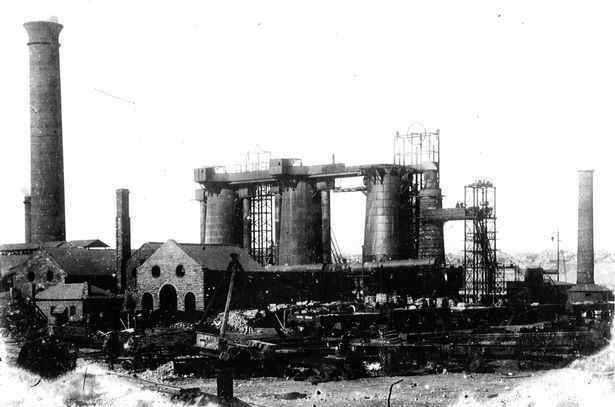News
Cardiff politicians in Kyiv, remembering the Welsh founded Donetsk – for talks

THE CITY founded by the Welsh as Hughesovka, known now as Donetsk, is at the centre of the conflict between the Ukraine and Russia, and the conflict which started in 2014 now looks likely to escalate into a larger war.
In 1869, one hundred people from South Wales, led by John Hughes from Merthyr Tydfil founded a city now home to a million people. This is part of the reason that a delegation arrived in Ukraine today (Feb 19), led by two members of the Welsh Senedd: Mick Antoniw MS and Adam Price MS, leader of Plaid Cymru.
The aim of the delegation, which includes prominent UK trade union leaders, academics and journalists, is to do what no politicians visiting the country have so far done: to express direct, cross-border solidarity from the UK working class to the Ukrainian working class.

With the threat of war rising, there is a concerted campaign of disinformation against Ukraine in the West, some of it aimed at influencing the progressive movements who have traditionally, and correctly, opposed Western military adventures in the Middle East.
To separate truth from propaganda, the delegation will hear evidence from workers from the Donbas in the East of Ukraine, independent trade unions and progressive civil society groups in Kyiv, as well as MPs, academics and territorial defence units training to resist aggression.
The delegation also includes ASLEF general secretary Mick Whelan, NUM general secretary Chris Kitchen, former Labour MEP Julie Ward, journalist Paul Mason, and Greenwich University economist Yuliya Yurchenko.
Mr Antoniw said: “In too many of the discussions about the situation in Ukraine it is the people themselves who are being bypassed. We want to listen to what the Ukrainian people say and to show our solidarity with them. We stand by them and their right to determine their own future and to defend their country from Russian aggression and imperialism.”
Adam Price said: “The more the Ukrainian people are threatened by Russian aggression and imperialism the more urgent it becomes for socialists, democrats and internationalists to stand shoulder to shoulder in solidarity with them – in defence of their right to national self determination and in defiance of Putin’s warmongering.
“They shall not pass ! вони не пройдуть !”

After President Yanukovych fled Ukraine to seek asylum in Russia, Russian-backed defenders took over the Oblast State Administration, the main government building, in the city. According to Russian reports, the police did not offer resistance.
On 7 April 2014, pro-Russian activists announced that they had seized control of Donetsk and declared the “Donetsk People’s Republic”
But what is the Welsh link, and why was the city founded. And why are Welsh politicians now heading to the Ukraine?
THE FOUNDING OF A CITY
In 1868, the Millwall Iron Works Company received an order from the Imperial Russian Government for the plating of a naval fortress being built at Kronstadt on the Baltic Sea
Hughes accepted a concession from the Imperial Russian Government to develop metal works in the region, and in 1869 acquired a piece of land to the north of the Azov Sea from Russian statesman Sergei Kochubey
He formed the ‘New Russia Company Ltd.’ to raise capital, and in the summer of 1870, at the age of 55, he moved to Russia. He sailed with eight ships, with not only all the equipment necessary to establish a metal works, but also much of the skilled labour; a group of about a hundred ironworkers and miners mostly from South Wales
He immediately started to build metal works close to the river Kalmius, at a site near the village of Alexandrovka. The state-of-the-art works had eight blast furnaces and was capable of a full production cycle, with the first pig iron cast in 1872. During the 1870s, collieries and iron ore mines were sunk, and brickworks and other facilities were established to make the isolated works a self-sufficient industrial complex. He further built a railway line-producing factory. All of Hughes’ facilities were held under the ‘Novorussian society for coal, iron and rails production.’

The Hughes factory gave its name to the settlement which grew in its shadow, and the town of Hughesovka (Yuzovka) grew rapidly. Hughes personally provided a hospital, schools, bath houses, tea rooms, a fire brigade and an Anglican church dedicated to the patron saints St George and St David. The land around the metalworks quickly grew to become an industrial and cultural centre in the region; the population of the city founded by Hughes now exceeds one million. Hughes died on 17 June 1889.
By the end of the nineteenth century, the works was the largest in the Russian Empire, producing 74% of Russian iron in 1913. A period of relative decline in the early years of the twentieth century was followed by expansion during World War I. Many of the men who accompanied John Hughes settled in Hughesovka and brought their wives and families. Over the years, although a Russian workforce was trained by the company, skilled workers from the United Kingdom continued to be employed, and many technical, engineering and managerial positions were filled by British immigrants; who were overwhelmingly Welsh. A thriving expatriate community was established, living in good quality company housing, and provided with an English school and an Anglican church. Despite the cold winters, hot summers and occasional cholera epidemics, some families remained in Hughesovka for many years.
The Bolshevik revolution of 1917 ended the Hughes family’s connection to the works. The Hughes brothers and almost all their foreign employees returned to Britain. The works were nationalised by the Bolsheviks in 1919. The town of Hughesovka was renamed “Stalino” in 1924, and then the present name “Donetsk” in 1961. The works survived and prospered despite regime and socio-economic change, and Donetsk remains a major metallurgical industries centre today.
In March 2014, following the annexation of Crimea by the Russian Federation, a humorous campaign advocated that Donetsk join the United Kingdom because of the city’s connection to Hughes. Shortly afterwards, the Ukrainian government lost control of Donetsk to militants of the self-declared Donetsk People’s Republic, who declared the city to be independent of Ukraine and advocated integration with Russia.
DID YOU KNOW
In 2014, an instrumental song on the Manic Street Preachers’ album Futurology paid homage to John Hughes, referring to Donetsk by its former name Hughesovka
Charity
Vincent Davies raises £13,682 for air ambulance charity

Independent Haverfordwest store backs lifesaving crews with year of community fundraising
A WEST WALES department store has raised more than thirteen thousand pounds for a lifesaving emergency service after a packed year of community fundraising.
Staff at Vincent Davies Department Store collected £13,682 for the Wales Air Ambulance Charity, after voting the organisation their Charity of the Year for 2025.
The independent retailer organised events throughout the year, including an Easter bingo, bake sales, quizzes, raffles, staff sales, Christmas jumper days and a festive wreath-making workshop. Charity jam jars placed in Café Vincent also helped gather steady donations from customers.
One of the most popular attractions was the store’s charity singing penguin trio, which drew smiles from shoppers of all ages and boosted collections.
Sarah John, Joint Managing Director at Vincent Davies, said: “Raising £13,682 for the Wales Air Ambulance Charity is something we are extremely proud of at Vincent Davies Department Store. As a director, it’s wonderful to see our community come together to support a charity that makes such a lifesaving difference.”
The air ambulance is consultant-led, delivering hospital-level treatment directly at the scene of serious incidents and, when needed, transferring patients straight to the most appropriate specialist hospital.
Working in partnership with the NHS through the Emergency Medical Retrieval and Transfer Service, crews can provide advanced critical care including anaesthesia, blood transfusions and even minor surgical procedures before reaching hospital.
Operating across the whole of Wales, its teams travel the length and breadth of the country by helicopter and rapid response vehicle to reach patients quickly in both rural and urban areas.
This is not the first time the Haverfordwest store has backed the cause. In 2016, staff previously raised £5,831 when the charity was also chosen as their beneficiary.
Mike May, the charity’s West Wales Regional Fundraising Manager, said: “We are so grateful to Vincent Davies Department Store for raising an incredible amount for our charity. Throughout the year they put on a variety of different events and what a successful fundraising year it was.
“The charity needs to raise £13 million every year to keep our helicopters in the air and our rapid response vehicles on the road. By raising £13,682, the staff and customers have played an important part in saving lives across Wales.”
The store says it will announce its Charity of the Year for 2026 in the coming weeks.
Crime
Police assess complaints over Mandelson–Epstein links

Met says allegations will be reviewed to see if criminal threshold is met following release of US court files
SCOTLAND YARD is reviewing a series of complaints alleging possible misconduct in public office after fresh claims emerged linking former UK ambassador Peter Mandelson to convicted sex offender Jeffrey Epstein.
The Metropolitan Police Service confirmed it has received “a number of reports” following the publication of millions of pages of material by the United States Department of Justice, and will now decide whether any alleged conduct reaches the level required for a criminal investigation.
Commander Ella Marriott said the force would assess each report individually, stressing that a review does not automatically lead to formal proceedings.
The documents, widely referred to as the “Epstein files”, appear to show Mandelson corresponding with Epstein while serving as business secretary during the government of Gordon Brown at the height of the global financial crisis.
According to reports, Epstein was allegedly given insight into internal policy discussions, including proposals around banker bonus taxes in 2009 and details of a eurozone bailout package shortly before it was announced publicly.
Payments questioned
Bank records cited in the US disclosure reportedly show payments totalling 75,000 US dollars made to Mandelson between 2003 and 2004. It is also claimed Epstein paid for an osteopathy course for Mandelson’s husband.
Mandelson has denied any wrongdoing and said he has “no record or recollection” of the alleged transfers.
On Sunday he resigned his membership of the Labour Party, saying he did not want his continued association to cause further difficulty for the party.
In interviews, he dismissed suggestions that Epstein influenced his decisions as a minister and said nothing in the released files pointed to criminality or misconduct on his part.
Pressure mounts
The political fallout has intensified, with Downing Street confirming Keir Starmer has asked Cabinet Secretary Chris Wormald to carry out an urgent review into Mandelson’s historic contacts with Epstein while in office.
Brown has also called for an examination of whether any confidential or market-sensitive information was improperly shared during the financial crisis.
The case is the latest in a series of controversies linked to Epstein’s long-standing relationships with powerful figures on both sides of the Atlantic.
Police emphasised that no charges have been brought and that Mandelson is not currently under criminal investigation, but said the complaints process would be handled “thoroughly and impartially”.
Community
Councillor meets chief constable to address Monkton and Pembroke concerns

COUNTY COUNCILLOR Jonathan Grimes has met with the new Chief Constable of Dyfed-Powys Police to discuss crime, antisocial behaviour and wider community issues affecting residents in Pembroke and Monkton.
Cllr Grimes, who represents Pembroke St Mary South and Monkton, said the meeting followed his invitation for senior police leaders to visit the area and hear first-hand about local concerns.
The Chief Constable, Ifan Charles, attended alongside officers from the Pembroke Neighbourhood Policing and Protection Team, meeting the councillor in Monkton for what were described as open and constructive talks.
As part of the visit, they also spoke with Monkton Priory Community Primary School headteacher Dylan Lawrence and Danny Nash from Pembrokeshire County Council Housing Services to gather views from education and housing professionals.
Discussions covered a range of issues raised by residents, including domestic abuse, drug and alcohol misuse, antisocial behaviour and environmental concerns such as littering, dog fouling and dangerous or inconsiderate driving.
Cllr Grimes acknowledged recent police successes, particularly in tackling drug-related activity, but said enforcement alone would not solve the area’s challenges.
He said closer cooperation between the police, council services, schools and the wider community would be needed to deliver longer-term improvements.
The councillor added that he plans to encourage residents to form a local community group in the coming weeks, aimed at developing practical solutions and strengthening partnership working across the area.
-

 Health5 days ago
Health5 days agoConsultation reveals lack of public trust in health board
-

 News6 days ago
News6 days agoCaldey still unsafe, survivors warn — despite Abbey’s reform claims
-

 Community6 days ago
Community6 days agoPembrokeshire students speak at national Holocaust Memorial Day event
-

 News6 days ago
News6 days agoKurtz raises Gumfreston flooding in the Senedd as petition deadline nears
-

 Crime7 days ago
Crime7 days agoMan denies murdering brother as jury hears of ‘ferocious attack’ at Morriston flat
-

 Community7 days ago
Community7 days agoStorm Chandra: Morning impacts across Pembrokeshire
-

 Entertainment7 days ago
Entertainment7 days agoRapunzel brings festive magic to Torch Theatre
-

 Crime4 days ago
Crime4 days agoPembroke man accused of child sex offences sent to Swansea Crown Court


































